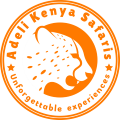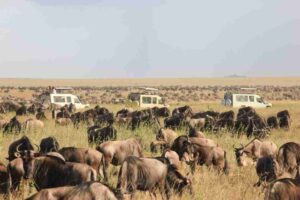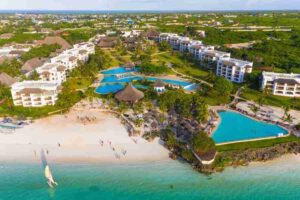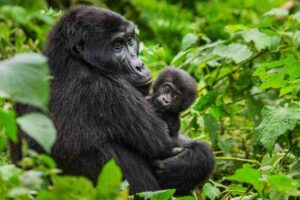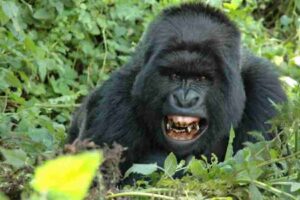| Name of the facility | Mara Explorer Camp |
|---|---|
| Certification Achieved | Silver |
| Year opened | 2000 |
| Tourism region | Masai Mara/South Rift |
| County | Narok |
| Address | Narok Map It |
| Telephone/Mobile | +254 (0) 706 856216 |
| maraexplorerscamp@gmail.com | |
| Website | maraexplorers.com |
| Facility Notes | Mara Explorer Camp is located within Masai Mara National Reserve along Talek River, approximately 15 kilometres from Talek gate. The camp was established in 2000 and is currently managed by Heritage Hotels. It has 10 guest tents with a total bed capacity of 20 guests. The facility is open all year round and has a total work force of 16 employees for its operations. The camp is set up inside a thick vegetation /forest cover, and shares most of its management facilities with the adjacent sister-camp – Mara Intrepids Camp. Both camps have a common water distribution system, garage, workshop, food stores and staff and guests clinic. The corporate social responsibility, including attending to community welfare is done through the Mara Intrepids Camp and the mother company – Heritage Hotels. The Maasai Mara National Reserve covers approximately 1,510 km2 under the management of Narok County. The Reserve is located in the northern portion of the Mara Serengeti eco-system, which covers 25,000 km2 straddling the Tanzania and Kenya international border. Serengeti Park borders the Reserve to the south, Siria (or Oloololo) Escarpment in the west and community-owned conservancies to the North and East of the reserve. The Reserve has about 95 species of mammals and 570 species of birds recorded. It is famous for hosting the wildebeest migration, which is dubbed as the ‘8th Wonder of the World’. The annual migration occurs from July to September and involves wildebeests, Thomson’s gazelles, Topi, elands, and zebras. These migrants are followed along their annual, circular route by predators, most notably lions and hyenas. Numerous other antelopes can be found, including Thomson’s and Grant’s gazelles, impalas, elands, duikers and Coke’s hartebeest. The Mara is also home to the “Big Five” (lion, leopard, African elephant, African buffalo, and Black Rhinoceros). The plains are also home to the distinctive Masai Giraffe. |
| Energy management | Mara Explorer Camp is powered by a generator with an output of 44KvA which provides power for lighting. Power is rationed at least 10 hours daily and fuel consumption documented to monitor usage. The facility has five (5) boilers for water heating which use charcoal briquettes Liquefied petroleum gas (LPG) is used for cooking both at the guests and staff quarters. Guest tents are fitted with rechargeable torches. On energy conservation; the facility Guests are briefed on energy conservation on arrival and through information folders in the guest tents. Staff is sensitized during departmental briefings. Has installed Low wattage energy saving bulbs throughout the premises. |
| Environmental management | Mara Explorer Camp is guided by the parent company –Heritage Hotels – environmental policy. The policy commits on; promoting responsible tourism, environmental conservation Sustainable practices. The Camp has undertaken its annual self-Environmental Audit (EA) as required by EMCA 1999 (Environmental Management and Co-ordination Act.). The facility has a resource monitoring system called ‘Dashboard’ for monitoring (fuel, water, energy, and waste) with set targets on the same. The records are analysed based on bed occupancy. The system is implemented by all heads of departments (HODs). |
| Chemical use | Biodegradable bathing soaps (supplied by Hanview) are used within the Camp. The chemicals are accompanied by Material Safety Data Sheet (MSDS) records Liquefied Petroleum gas LPG (one tonne tank) is well secured in a contained structure for safety reasons. Diesel is properly stored in a 200 litre reservoir. |
| Conservation Criteria | |
| Community Criteria | |
| Solid waste management | Waste separation (paper, plastics, metals glass and organic) is conducted at source and the bins are color-coded. The waste is later transported to the waste collection centre at Mara Intrepids for further segregation before final disposal via Heritage Hotels to recycling companies in Nairobi. Organic waste is transported to Mara Intrepids for composting. In efforts aimed at waste reduction, the facility uses reusable containers for bathing soaps |
| Water management | Mara Explorer camp obtains its water from a borehole located at Mara Intrepids. The water is piped and stored in a high elevated 5000 litre reservoir for supply via gravity to the entire premises. A meter has been installed at the main supply point. Water usage records are collected and analysed based on bed occupancy for monitoring purposes. The facility has installed a 5,000 rain water harvesting tank. On water conservation, the facility; Sensitizes guests upon arrival. Guests are encouraged to re-use their towels through “towel-talks”. Staff is sensitized during regular departmental briefings. Guest toilets are fitted with low shower filter heads and lift taps to reduce on water usage. |
| Visitor communication & education | Visitors are briefed upon arrival on the camp’s operations, reserve code of conduct and environmental values. Guests engage in low impact educational activities which include; game drives, village visits and nature walks – which are aimed at reducing the carbon footprint of the facility. The camp had a designated visitors’ information / reading section. The section is equipped with reading materials such as environmental publications, wildlife and travel magazines, and nature conservation magazines. Guest tents have information folders to brief visitors on the surrounding ecosystem. Mammal and bird lists are also available. |
| Pollution | The generator section is sound proofed to reduce noise pollution. The camp uses low light emitting bulbs in the guest tents and around the facility to reduce on light pollution. |
| Environmental conservation | Mara Explorer has a resident naturalist in charge of guiding guests within and explaining surrounding environment. The camp is unfenced which allows free movement of wildlife. In addition, natural vegetation is relatively undisturbed which gives a bush experience to clients. On weekly basis the facility participates in environmental clean-ups and sensitizations. This involves awareness on proper waste management and hygiene. The facility guides assist the reserve rangers in wildlife monitoring and reporting on any wildlife incidences. Low environmental impact activities such as nature walks, culture talks, village visits, and bird watching are offered at the camp. These activities are also aimed at ensuring low carbon footprint. In conjunction with its sister camp – Mara Intrepids, the camp has a tree planting initiative for both guests and staff aimed at promoting environmental conservation. The facility has built gabions along the Talek River to contain soil erosion. |
| Waste water management | Grey water from the guest kitchen is managed through a grease trap to filter excess fats and oils before draining into the septic tank system. Grey waste water for the staff quarters, guest tents and public areas is managed through septic tanks. The facility has six septic tanks that are linked to soak-ways Black effluent from the guest tents and public areas is managed through three chamber septic tanks. Biological enzymes are used in the septic tanks to enhance sludge digestion. In compliance with Environmental Management Co-ordination (Water Quality) regulations of 2006, the facility has applied for an effluent discharge license |
| Purchasing and supplies | All purchases for the facility are done centrally with/by its sister camp-Mara Intrepids. Supplies for staff food are bought in bulk to reduce on packaging while guest food is bought on demand. |
| Employment and remuneration/staff welfare | Employees are provided with, food, medical care, uniform, an entertainment centre, transport and accommodation facilities Staff accommodation at Mara Explorer is well maintained i.e. clean and well kept. The staffs are paid in line with the minimum wage, are given letters of appointment, code of conduct and job descriptions upon employment. The facility runs a staff reward scheme for recognizing outstanding conservation efforts and achievement by the staff. |
| Staff education, communication and awareness training | The Camp holds weekly departmental meetings and daily briefs are held for staff sensitization. The facility has notice boards for staff communication. Emails and memos are also used to facilitate communication |
| Cultural preservation and promotion/protection of local sites | The guests are sensitized on the local Maasai culture and engage in traditional activities. A fee of $20 is charged per person for the visits. The money is channelled directly to the locals. $5 is deducted for management purposes. Cultural dances and lectures are organized on demand and provided by the local community. The proceeds are given to the community. |
| Benefits to local community/community empowerment | The facility employs from the local community. Approximately 70% of the staff is from the local Masai community. Priority for casual labor is also given to the local community. Mara Explorer camp runs its Corporate Social Responsibility (CSR) programs jointly with Mara Intrepids thorough its mother company-Heritage Hotels-aimed at supporting the local community initiatives. The camp purchases locally where possible, these include, fuel and staff meat. There is an established internship program for locals at the camp, with an intake at least every six (6) months. The facility through guest contributions support Loigero primary school through donations such as text books, shoes, stationery and sports equipment. In 2016, the facility donated 120 beds and bedding to the local Loigero school The facility clinic caters for the local community’s medical care. The camp also provides transport for the community during emergencies such as medical referrals. On weekly basis the camp purchases a goat from the local community |
| Cultural Criteria | |
| Health and safety | The Camp has a health and safety policy committed to compliance with relevant health and safety regulations, client safety and safe working conditions for employees. The facility has a designated health and safety committee which meets on quarterly basis to spearhead health issues within the facility. The committee also conducts regular in-house training on health and safety. The camp has been inspected and issued with a Health Clearance Certificate in compliance with the Public Health Act. Medical tests for food and beverage handlers are done to comply with Food, Drugs, and Chemical substances Act. Cap 254. Fire-fighting equipment including, fire extinguishers, fire blanket in the kitchen, are serviced and strategically placed at key areas within the facility. Sand buckets are also provided to complement the fire extinguishers. Safety and precautionary signage has been installed at the gas storage area, fire assembly points are clearly marked and displayed within the Camp and a fire alarm has been fitted within the premises. The Camp provides PPE (Personal Protective Equipment) such as overall, gloves and boots to the staff and a team of staff trained on basic fire-fighting skills. In addition, the camp has fire emergency procedures well outlined within the guest tents. The facility has conducted a fire safety audit to comply with Factories and other places of work (Fire Risk Reduction) Rules 2007. The camp has conducted a safety and Health Audit to comply with the Occupational Safety and Health Act, 2007 and obtained a registration of workplace – Dated July 2017 |
| Child labor, abuse and human rights | The Camp has well defined Human Resource policy that guides against employment of minors. Minimum employment age is 18years. All clients visiting the hotel are screened for their IDs. |
| Business Practises Criteria | |
| Entry Date | 12th March 2018 |
Mara Explorer Camp
Safe, Sustainable, Affordable & Unforgettable Africa safari experiences that Educate, Connect, Transform and Inspire.
Your dream safari in Kenya & East Africa is just a call or email away. Contact Adeli Kenya Safaris today. Tel: +254720564538 | WhatsApp: +254720564538 | Email: info@adelikenyasafaris.com
Share this:
Why Go with Adeli Kenya Safaris
- Born, raised & based in Africa. Let u show you the Africa we know well and cherish so much
- Africa sustainable travel is our passion
- Great Value for Money. Best price guaranteed
- Experienced team of travel experts
- Knowledgeable & multi-lingual safari guides
- Safety conscious
- Fleet of well maintained vehicles
Your dream safari / holiday is just a call or email away. Contact Adeli Kenya Safaris today. Tel: +254720564538 | WhatsApp: +254720564538 | Email: info@adelikenyasafaris.com
EXPLORE OUR FEATURED EAST AFRICA SAFARI HOLIDAY DESTINATIONS
FEATURED TOURS & HOLIDAY PACKAGES BY COUNTRY
Go Wander the wonderful world with Adeli Kenya Safaris

Africa Safari Tour Packages
Africa is more than just a destination—it is a feeling, an awakening, and a journey that touches the soul in ways words can hardly capture. Africa is a continent that stirs the soul, awakens curiosity, and leaves every traveler forever changed.
Europe Holiday Packages
SouthEast Asia Holiday Packages
Middle East Holiday Packages
Indian Subcontinent Holiday Packages
Central Asia Holiday Packages
Far East Holiday Packages
Australasia Holiday Packages
North America Holiday Packages
Central America Holiday Packages
South America Holiday Packages
Cruise Holiday Packages
Adeli Kenya Safaris, Kenya safari, African safari Kenya, Wildlife safari Kenya, Kenya wildlife tours, Kenya game drives, Safari holidays Kenya, Kenya safari tours 2025, Best Kenya safaris, Luxury Kenya safaris, Affordable Kenya safaris, Masai Mara safari, Amboseli safari, Tsavo National Park safari, Lake Nakuru safari, Walking safari Kenya, Hot air balloon safari Masai Mara, Birdwatching safari Kenya, Family safari Kenya, Photography safari Kenya, Cultural safari Kenya, Beach and safari Kenya, Private safari Kenya, Fly-in safari Kenya, Camping safari Kenya, Luxury tented camps Kenya, Best time to see the Great Migration in Masai Mara, Affordable family safari packages in Kenya, Luxury safari lodges in Kenya with private game drives, Walking safaris in Laikipia conservancy, Hot air balloon safari over Masai Mara at sunrise, Best birdwatching spots in Kenya during November, Family-friendly safari resorts near Nairobi, Photography tours in Amboseli with Kilimanjaro views, Cultural experiences with the Maasai tribe in Kenya, All-inclusive beach and safari packages in Kenya coast, Private guided safaris in the Chyulu Hills, Fly-in safari to remote areas of northern Kenya, Budget camping safaris in Tsavo East National Park, Luxury tented camps in the Mara Triangle for honeymooners, Best wildlife viewing in Kenya during the dry season (July-October), Ethical wildlife safaris in Kenya supporting conservation, Small group safari tours in Kenya for solo travelers, Wheelchair accessible safari options in Kenya, Kenya safari itineraries for first-time visitors, Best Kenya safari for seeing rhinos, Tanzania safari, African safari Tanzania, Wildlife safari Tanzania, Tanzania wildlife tours, Tanzania game drives, Safari holidays Tanzania, Tanzania safari tours 2025, Best Tanzania safaris, Luxury Tanzania safaris, Affordable Tanzania safaris, Serengeti safari, Ngorongoro Crater safari, Zanzibar safari, Tarangire safari, Lake Manyara safari, Ruaha National Park safari, Nyerere National Park (Selous) safari, Kilimanjaro safari (often combined with wildlife), Mahale Mountains chimpanzee trekking, Gombe Stream chimpanzee trekking, Best time to see the Great Migration in Serengeti, Luxury lodges in Ngorongoro Crater with wildlife viewing, Family safari packages in Tanzania with beach extension, Walking safaris in northern Tanzania, Hot air balloon rides over the Serengeti plains, Birdwatching tours in Lake Manyara National Park, Cultural tours in Tanzania combined with safari, Affordable camping safaris in Tanzania’s southern circuit, Photography workshops on Tanzania safaris, Honeymoon safari packages in Serengeti and Zanzibar, Wildlife safaris near Arusha for short trips, Chimpanzee trekking tours in western Tanzania, Best Tanzania safari for seeing the Big Five, Small group safari tours in Tanzania for solo travelers, Tanzania safari itineraries including Kilimanjaro trek, Ethical and sustainable safari options in Tanzania, Fly-in safaris to remote parks in Tanzania, Best time for wildlife photography in Tanzania, Tanzania safari deals and discounts, Serengeti Great Migration river crossing tours, best tour company in Kenya, best safari company in Kenya, best tour operator in Kenya, best travel company in kenya, best travel agency in kenya, best kenya safari company, nairobi safaris, nairobi kenya safaris, kenya safaris, safari in kenya, kenya wildlife safaris, kenya safari tour, kenya tours, Best responsible tours and travel agency in kenya, Best responsible tours and travel company in Tanzania, Best responsible tours and travel company in Zanzibar, Best responsible tours and travel company in Uganda, Best responsible tours and travel company in Rwanda, Best responsible tours and travel company in Botswana, Best responsible tours and travel company in Namibia, Best responsible tours and travel company in South Africa, Best responsible tours and travel company in Mauritius, Best responsible tours and travel company in Seychelles, Best responsible tours and travel company in Madagascar, Best responsible tours and travel company in Mozambique, Best responsible tours and travel company in Egypt, Best responsible tours and travel company in Israel, Best responsible tours and travel company in Thailand, Best responsible tours and travel company in East Africa, Best responsible tours and travel company in Eastern Africa, Best responsible tours and travel company in Africa, Best responsible tours and travel company in the world, Best responsible tours and travel company in Thailand, Best responsible tours and travel company in Malaysia, Best responsible tours and travel company in Croatia, Best responsible tours and travel company in Vietnam, Best responsible tours and travel company in Dubai, Best responsible tours and travel company in Singapore, Best responsible tours and travel company in Brazil, Best responsible tours and travel company in America, Best responsible tours and travel company in Canada, Best responsible tours and travel company in Europe, Best responsible tours and travel company in Greece, Best responsible tours and travel company in Turkey, Best responsible tours and travel company in Faroe Islands, Best responsible tours and travel company in Morocco, What is ecotourism, responsible travel, best green tourism company in kenya, best sustainale travel company in kenya, best ecotourism ompany in kenya, best sustainable travel practices, best things to to do in kenya, best things to to do in Nairobi, best things to to do in kenya, best things to to do in Mombasa, best things to to do in kenya, best things to to do in kenya, best things to to do in Nakuru, best things to to do in kenya, best things to to do in Naivasha, best things to to do in kenya, best things to to do in Maasai Mara, best things to to do in kenya, best things to to do in Kisumu, best things to to do in kenya, best things to to do in Amboseli, best things to to do in kenya, best things to to do in Tsavo West, best things to to do in kenya, best things to to do in Tsavo West, best things to to do in kenya, best things to to do in Samburu, best things to to do in kenya, best things to to do in Tanzania, best things to to do in kenya, best things to to do in Zanzibar, best things to to do in kenya, best things to to do in Uganda, best things to to do in kenya, best things to to do in Uganda, best things to to do in kenya, best things to to do in Rwanda, best things to to do in kenya, best things to to do in Mauritius, best things to to do in kenya, best things to to do in Seychelles, best things to to do in kenya, best things to to do in South Africa, best things to to do in kenya, best things to to do in Mozambique, best things to to do in kenya, best things to to do in Madagascar, best things to to do in kenya, best things to to do in Zambia, best things to to do in kenya, best things to to do in Israel, best things to to do in kenya, best things to to do in Dubai, best things to to do in kenya, best things to to do in Thailand, best things to to do in kenya, best things to to do in Greece, best things to to do in kenya, best things to to do in Santorini, best Tour Operator in Kenya, bestTour Operators in Nairobi, Tours in Kenya, Travel Agency in Nairobi, safari, kenya safari, kenya tours, tours and travel kenya, eco safaris, ecotourism, eco tourism, responsible travel, green tourism, agro tourism, east african safari air, kenya tanzania tours, africa tours, masaimara safari, tanzania safari, kenya travel, africa safari, nairobi safari, kenya safari tours, african safari, kenya safaris from nairobi, kenya wildlife safari, serengeti safari tour, safar tours & travels, best tour operators, luxury african safari tours, best african safari for seniors, african safari and beach package holidays, africa safari camp, kenya safari packages, kenya safari holidays, uganda safari packages, best places to go on safari in africa, best african safari itinerary, kenya wildlife safari packages, deal africa, travel operators, tour africa safaris kenya, luxury safari company, east african safari packages, safari travel companies, top safari tour operators, african safari travel agent, africa travel deals, trip safari, best safari experience, african safari photography, kenya holidays 2018, kenya safaris from nairobi, kenya safari, kenya holiday packages, kenya holidays, weekend getaways in nairobi, holiday destinations in kenya, weekend getaways in kenya, kenya safari holidays, tours and travel kenya, domestic holiday packages in kenya, kenya safari packages, tour operators in kenya, kenya destinations, kenya holidays 2017, kenya travel, kenya tours, tours and travel companies in kenya, kenya safari tours, safari kenya, kenya holidays 2018, kenya safari prices, holidays in kenya, travel agencies in kenya, dubai holiday packages from kenya, cheap holiday packages in kenya, cheap holiday destinations in kenya, getaways in kenya, kenya safari all inclusive packages, kenya all inclusive resorts, cheap january holiday deals, dubai holiday packages from dubai, vacation places in kenya, affordable holiday destinations in kenya, holiday getaways in kenya, trip kenya, kenya safari beach holidays, kenya safari vacation packages, travel package holidays, best travel package deals, trip to kenya safari, kenya’s best DMC, Kenya’s best tour operator ‘ Kenya’s best travel agency , Africa’s best DMC , Africa’ best tour operator , best kenya tour companies, luxury tour companies in kenya , why I love kenya , #whyilovekenya , join up safaris kenya , budget safaris in kenya , flying packages kenya , beach safaris in kenya , top rated tour companies in kenya , rooftent camping in kenya, safaribookings , tripadvisor, photography safaris in kenya , , best Tanzania safaris , kenya and Tanzania safaris , Tanzania road safaris , Tanzania flying packages, dubai packages , south Africa holiday packages, Seychelles holiday packages , Mauritius holiday packages , easter holiday packages , Christmas holiday packages , Wildebeest migration, kenya wildebeest migration, wildebeest migration kenya, wildebeest migration in Kenya, masaimara national reserve, travel kenya, traveling to kenya, travelling to kenya, kenya travel advisory, kenya travel advice, travel in kenya, travel agents in kenya, travelling in kenya, traveling in kenya, kenya travel agents, travel to kenya advice, travel advice to kenya, travel agents kenya, travel advisory to kenya, travel agency kenya, travel advisor kenya, travel alerts kenya, travel agencies kenya, kenya travel agencies, travel deals kenya, travel diaries kenya, kenya travel tips, tour operators in kenya, kenya tours and safaris, tours in kenya, tours and travel kenya, tours kenya, tours of kenya, kenya tour companies, tours and travel in kenya, tour to kenya, kenya tours and travel companies, kenya wildlife tours, tours and travels in kenya, trip to kenya, trips to kenya, kenya trip, kenya trips, trip to kenya Africa, trip advisor kenya, kenya trip advisor, visit kenya, visiting kenya, kenya visit, where to visit in kenya, why do people visit kenya, kenya tourism, tourism in kenya, tourism kenya, tourism of kenya, kenya and tourism, kenya safaris, safaris in kenya, safaris kenya, kenya lodge safaris, african safaris kenya lodge safaris kenya, safaris to kenya, kenya camping safaris, kenya african safaris, camping safaris kenya, kenya tourist attraction, tourists in kenya, tourist attraction in kenya tourist spots in kenya, kenya tourists, kenya tourist spots, why do tourists visit kenya, kenya holiday, holidays in kenya, holidays to kenya, kenya holidays, holiday in kenya, holidays kenya, holiday to kenya, holiday kenya, kenya travel guide, travel guide kenya, kenya guide, travel guide to kenya, kenya information guide, kenya tour packages, kenya holiday packages, kenya vacation packages, kenya packages, holiday packages in kenya, kenya travel packages, holiday packages kenya, kenya package, kenya holiday package, kenya tour package, kenya package holidays, travel packages kenya, kenya safaris packages, places to visit in kenya, kenya places to visit, best places to visit in kenya, tourist places in kenya, places to see in kenya, kenya tourist places, places in kenya to visit, places to visit kenya, go kenya tours, go kenya, places to go in kenya, go to kenya, where to go in kenya, going to kenya, why do people go to kenya, why go to kenya, information on kenya, kenya information, kenya travel information, information kenya, information of kenya, holiday destinations in kenya, kenya destinations, tourist destinations in kenya, kenya holiday destinations, kenya tourist destinations, best holiday destinations in kenya, kenya as a tourist destination, holiday destinations kenya, blogs in kenya, travel blog kenya, kenya blogs, blogs travel to kenya, safaris in kenya, kenya safaris, safaris kenya, safaris to kenya, car hire Nairobi, car hire in Nairobi, nairobi car hire, car hire services in Nairobi, car hire kenya Nairobi, car hire companies in Nairobi, car hire nairobi kenya, cars for hire in Nairobi, car hire in kenya Nairobi, car hire services Nairobi, cheap car hire Nairobi, nairobi car hire services, car hire in nairobi kenya, car hire companies in nairobi kenya, car for hire in Nairobi, car hire companies Nairobi, 4wd car hire Nairobi, cheap car hire in Nairobi, car hires in Nairobi, nairobi airport car hire, 4×4 car hire Nairobi, car hire market, cars for hire nairobi , car hire Mombasa, car for hire Nairobi, car hire uganda , 4×4 hire Nairobi, car hire Tanzania, 4×4 car hire dar es salaam, 4×4 car hire Tanzania, car hire kenya, 4×4 car hire kenya, car hire in kenya , kenya car hire, 4×4 car hire Uganda, 4×4 car hire Arusha, kenya tours and safaris, tours in kenya, tours and travels in kenya, tours kenya, tours of kenya, tours to kenya, go kenya tours, tour to kenya , car hire companies in kenya , 4wd car hire kenya, go kenya tours and safaris, kenya wildlife tours, car hire services in kenya, terminal tours kenya, kenya tanzania tours, tours and travel in kenya , kenya budget tours , tours and travel jobs in kenya, tours and safaris in kenya , kenya adventure tours, tours kenya Tanzania, tour operators, tanzania tour operators, tours and travel kenya, tour operators in Tanzania, top tour operators, african tour operators, tour firms in kenya , car hire kenya rates , car hire in kenya prices, kenya car hire services, mombasa tour operators, cars for hire in kenya, car hire kenya prices, kenya safaris, car hire business in kenya, tour kenya, kenya wildlife safaris, safaris to kenya, kenya camping safaris, wildlife safaris kenya, african safaris kenya, kenya budget safaris, safaris kenya, kenya tanzania safaris, kenya african safaris, tour companies in kenya, kenya car hire companies, car hire services kenya, cheap car hire in kenya, tours and travel companies in kenya, tour and travel companies in kenya, kenya tour companies, executive car hire kenya, tour companies kenya, wildlife kenya safaris, safaris in kenya, travel companies in kenya , tourism companies in kenya, kenya tours and travel companies, tours and safaris companies in kenya, companies in kenya, list of companies dealing with travel tours in kenya, kenya tour, tours companies in kenya, list of tour companies in kenya, best companies in kenya, kenya companies, 4×4 camping, 4×4 holidays, camping 4×4, 4×4 excursion, kenya tours,kenya best hotels,best hotels in kenya,kenyahotels,honeymoon destinations in kenya, 4×4 kenya, Rooftemt camping in kenya, rooftent hire in kenya, Nairobi safari tours, mombasa safari tours, amboseli safari tours, nakuru safari tours, naivasha safari tours, lake bogoria safari tours, lake baringo safari tours, maasai mara safari tours, tsavo east safari tours, tsavo west safari tours, samburu safari tours, ol pejeta conservancy safari tours, aberdare national park safari tours.
